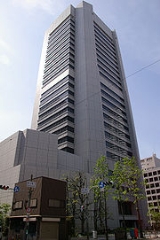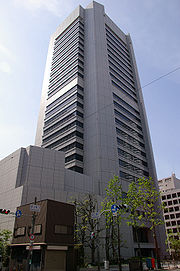
Resona Holdings
Encyclopedia

Holding company
A holding company is a company or firm that owns other companies' outstanding stock. It usually refers to a company which does not produce goods or services itself; rather, its purpose is to own shares of other companies. Holding companies allow the reduction of risk for the owners and can allow...
of , the fourth-largest banking group in Japan
Japan
Japan is an island nation in East Asia. Located in the Pacific Ocean, it lies to the east of the Sea of Japan, China, North Korea, South Korea and Russia, stretching from the Sea of Okhotsk in the north to the East China Sea and Taiwan in the south...
.
The company was originally established on December 12, 2001 as Daiwa Bank Holdings, Inc., the result of the consolidation of Daiwa Bank, Kinki Osaka Bank, and Nara Bank. After acquiring Asahi Bank on March 1, 2002, the company was renamed Resona Holdings, Inc. on October 1, 2002.
The group has two head offices: one is located in Osaka
Osaka
is a city in the Kansai region of Japan's main island of Honshu, a designated city under the Local Autonomy Law, the capital city of Osaka Prefecture and also the biggest part of Keihanshin area, which is represented by three major cities of Japan, Kyoto, Osaka and Kobe...
, and the other in Tokyo
Tokyo
, ; officially , is one of the 47 prefectures of Japan. Tokyo is the capital of Japan, the center of the Greater Tokyo Area, and the largest metropolitan area of Japan. It is the seat of the Japanese government and the Imperial Palace, and the home of the Japanese Imperial Family...
.
History
In early 2003 the Resona Group's capital adequacy ratio fell dangerously low. The bank had proposed to maintain its capital adequacy ratio above the legal limit by factoring in deferred tax assets. However, the value of these deferred assets could only be claimed if the company turned a profit in the future. Because of bank's profit outlook was so dim, Resona's auditor refused to certify the company's financial statement if the deferred tax assets were included. Without being able to count the deferred tax assets, the bank was effectively insolvent.The Resona case threatened to cripple the entire country's financial system, since the other major banks were also counting on deferred tax assets to maintain their capital adequacy ratios. On May 17, 2003, the Japan government decided to inject 1.96 trillion yen in public funds into the Resona Group through Resona Bank. This move, through the share exchange agreement between the bank and the holding company, effectively nationalized
Nationalization
Nationalisation, also spelled nationalization, is the process of taking an industry or assets into government ownership by a national government or state. Nationalization usually refers to private assets, but may also mean assets owned by lower levels of government, such as municipalities, being...
the bank, since the government emerged as the company's majority shareholder, holding 68.25% of voting rights of the holding company, while the holdings of existing shareholders was greatly diluted. The existing management was sacked and a new management was installed.
The bank's new management immediately set about to reduce Resona's non-performing loan
Non-performing loan
A Non-performing loan is a loan that is in default or close to being in default. Many loans become non-performing after being in default for 3 months, but this can depend on the contract terms....
s (NPLs). In 2004, the company managed to turn a profit of ¥386 billion. As a result, Resona's management announced a plan to, over the next 10 years, return to the government ¥868 billion of the ¥3 trillion in public funds it has received.
Past scandal
In 1995, one of Daiwa Bank's bondBond (finance)
In finance, a bond is a debt security, in which the authorized issuer owes the holders a debt and, depending on the terms of the bond, is obliged to pay interest to use and/or to repay the principal at a later date, termed maturity...
traders, Toshihide Iguchi
Toshihide Iguchi
is a former Japanese government bond trader at Daiwa Bank responsible for $1.1 billion in losses involving 30,000 unauthorized trades over a period of 11 years beginning in 1984.- Biography :...
, in New York
New York
New York is a state in the Northeastern region of the United States. It is the nation's third most populous state. New York is bordered by New Jersey and Pennsylvania to the south, and by Connecticut, Massachusetts and Vermont to the east...
lost $1.1 billion speculating in the bond market. The company was later indicted for not reporting crimes by Iguchi including selling unauthorized sale of client's securities to cover losses.
Group Companies
- Resona Bank, Ltd.
- Saitama Resona Bank, Ltd.Saitama Bankis a Japanese bank founded in Saitama Prefecture 1943. After a series of bank mergers and corporate restructuring, the emerged as the leading bank in Saitama Prefecture.-History:...
- The Kinki Osaka Bank, Ltd.
- Resona Trust & Banking Co., Ltd.

